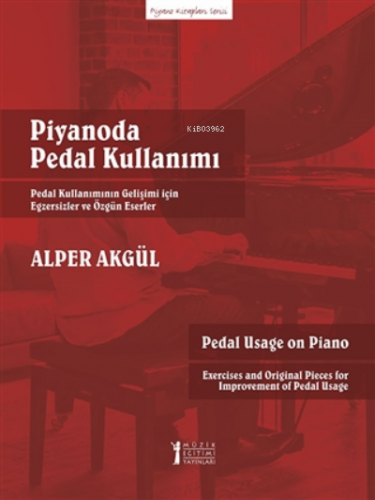
Pedal, piyano enstrümanında çok önemli bir işleve sahiptir. Piyano eğitimine başlayan öğrenciler ilk derslerde her zaman “bu pedallar ne işe yarıyor?” sorusunu öğretmenlerine sorarlar. Öğrenciler, piyano öğrenme süreçleri başladıktan bir süre sonra literatürdeki pedal içeren eserleri çalışmaya başlarlar. Meslek yaşantım boyunca, piyano eğitimine başlattığım öğrencilerin pedal ile çalma seviyesine geldiklerinde el ve ayak koordinasyonlarının gelişimi için derslerde yazdığım teknik çalışmalar ile pedal yeteneğinin gelişimi için yazdığım özgün eserleri bir araya getirerek bir çalışma kitabı hazırladım. Pedal çalımına yeni başlayacak öğrencinin kolaydan zora doğru hazırlanan çalışmalarla pedal hakimiyeti kazanmasını hedefledim. Parçaların el pozisyonlarını öğrenciyi zorlamayacak bir şekilde seçmeye çalışarak, onların pedala ve değişimine daha çok odaklanmalarına önem verdim. Kitaptaki çalışmalar, teknik alıştırmalar ve özgün parçalardan oluşmaktadır. Başlangıç seviyesi piyano literatüründeki parçalarla beraber çalınabilir. Özellikle konservatuvarlar, müzik öğretmenliği bölümleri ile müzik bölümlerinde bir ya da iki yıl süre ile görülen yardımcı piyano dersleri için alternatif bir kaynak olarak kullanılabilir. Ayrıca ülkemizde müzik eğitiminin yaygınlaşmasında büyük bir öneme sahip olan özel müzik kurslarında görev yapan piyano eğitmenleri için alternatif bir egzersiz ve eser dağarcığı kitabıdır. Kitap içerisinde yer alan çalışmalar ve parçalar, pedal gelişiminin desteklenmesi için yardımcı niteliktedir.
In piano, the pedal occupies an important function for the instrument. In their first lessons, students keep asking to their teachers what the pedals are for in the beginning. After a while, students start playing works from the literature that includes the pedal. I prepared this workbook by combining the technical studies I wrote in lessons in order to develop hand and foot coordination of the students who started piano education and the original works I wrote for the development of pedal ability for the stage when the students reach the level of playing with the pedal throughout my professional life. I aimed for the students who just start using the pedal in the piano and wanted them to gain pedal control with the exercises from easy to difficult level. By trying to choose the hand positions and technical structures of the parts in a way that does not force the students, I gave importance to make students' focus more on pedal press and change. This workbook consists of technical exercises and original parts. It can be studied along with pieces from the beginner piano literature. It can be used as an alternative resource for one or two-year supplementary piano lessons, especially in conservatories, music teaching departments, and music departments. Furthermore, it is an alternative exercise and repertoire book for piano instructors working in private music courses, which are significant in spreading music education through our country. The studies and parts in the book are of a helpful nature to support pedal development.
Pedal, piyano enstrümanında çok önemli bir işleve sahiptir. Piyano eğitimine başlayan öğrenciler ilk derslerde her zaman “bu pedallar ne işe yarıyor?” sorusunu öğretmenlerine sorarlar. Öğrenciler, piyano öğrenme süreçleri başladıktan bir süre sonra literatürdeki pedal içeren eserleri çalışmaya başlarlar. Meslek yaşantım boyunca, piyano eğitimine başlattığım öğrencilerin pedal ile çalma seviyesine geldiklerinde el ve ayak koordinasyonlarının gelişimi için derslerde yazdığım teknik çalışmalar ile pedal yeteneğinin gelişimi için yazdığım özgün eserleri bir araya getirerek bir çalışma kitabı hazırladım. Pedal çalımına yeni başlayacak öğrencinin kolaydan zora doğru hazırlanan çalışmalarla pedal hakimiyeti kazanmasını hedefledim. Parçaların el pozisyonlarını öğrenciyi zorlamayacak bir şekilde seçmeye çalışarak, onların pedala ve değişimine daha çok odaklanmalarına önem verdim. Kitaptaki çalışmalar, teknik alıştırmalar ve özgün parçalardan oluşmaktadır. Başlangıç seviyesi piyano literatüründeki parçalarla beraber çalınabilir. Özellikle konservatuvarlar, müzik öğretmenliği bölümleri ile müzik bölümlerinde bir ya da iki yıl süre ile görülen yardımcı piyano dersleri için alternatif bir kaynak olarak kullanılabilir. Ayrıca ülkemizde müzik eğitiminin yaygınlaşmasında büyük bir öneme sahip olan özel müzik kurslarında görev yapan piyano eğitmenleri için alternatif bir egzersiz ve eser dağarcığı kitabıdır. Kitap içerisinde yer alan çalışmalar ve parçalar, pedal gelişiminin desteklenmesi için yardımcı niteliktedir.
In piano, the pedal occupies an important function for the instrument. In their first lessons, students keep asking to their teachers what the pedals are for in the beginning. After a while, students start playing works from the literature that includes the pedal. I prepared this workbook by combining the technical studies I wrote in lessons in order to develop hand and foot coordination of the students who started piano education and the original works I wrote for the development of pedal ability for the stage when the students reach the level of playing with the pedal throughout my professional life. I aimed for the students who just start using the pedal in the piano and wanted them to gain pedal control with the exercises from easy to difficult level. By trying to choose the hand positions and technical structures of the parts in a way that does not force the students, I gave importance to make students' focus more on pedal press and change. This workbook consists of technical exercises and original parts. It can be studied along with pieces from the beginner piano literature. It can be used as an alternative resource for one or two-year supplementary piano lessons, especially in conservatories, music teaching departments, and music departments. Furthermore, it is an alternative exercise and repertoire book for piano instructors working in private music courses, which are significant in spreading music education through our country. The studies and parts in the book are of a helpful nature to support pedal development.











